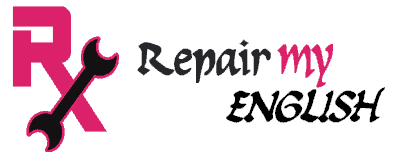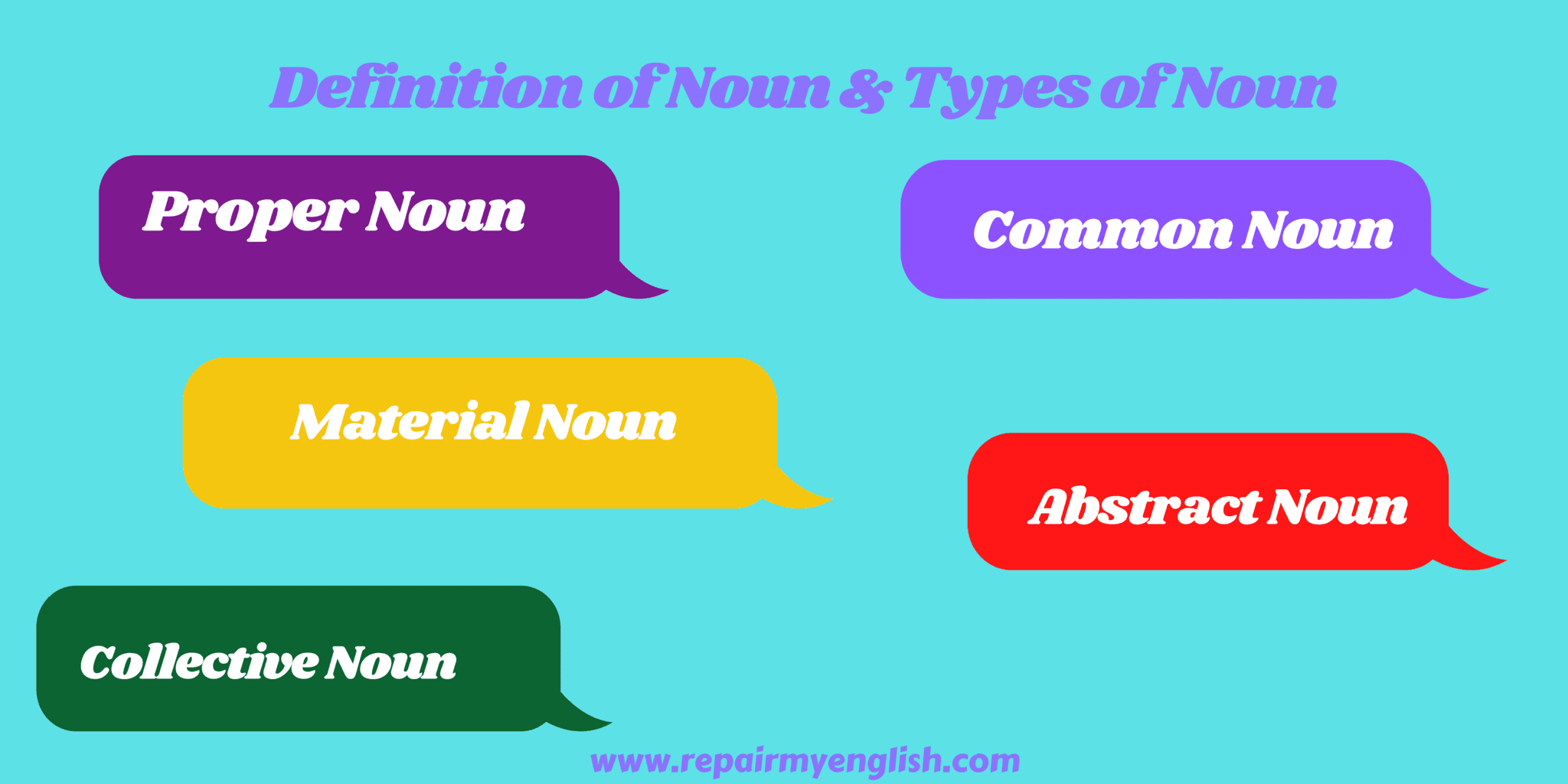Definition of Noun:
The Noun is a part of speech. It refers to the name of a person, place, or thing.
Examples:
- Reena went to Mumbai.
- There are five members in my family.
- The boy is playing in the backyard.
- Her ring is made of diamond.
- Work is worship.
Kinds of Noun:
- Proper Noun
- Common Noun
- Material Noun
- Abstract Noun
- Collective Noun
Proper Noun: The Noun that tells the name of the proper place, person, or thing is called Proper Noun.
Features:
It always starts with capital letters, no matter where it appears in a sentence.
Proper Noun doesn’t have plural forms; they are always singular.
Generally, proper Noun doesn’t take any Article (a, an or the) with it.
However, “The” article is used with Proper Nouns when it refers to the name of rivers, oceans, mountains, buildings, books, newspapers, etc.
Proper Noun Examples:
- The Ganga is a holy river.
- Bengaluru is a huge city.
- Akbar was a great emperor.
- Mohit has a house near the Thames River.
- We go for a walk by the lake every Saturday.
Common Noun:
A common noun refers to a person, location, object, or idea in a general sense. Until they start a sentence, these nouns are usually not capitalized.
Common Noun Examples:
- Zebra eats grass.
- The tables are filthy.
- He reads books.
- Birds chirp.
- Her father is a surgeon.
Common Nouns are further divided into Countable and Uncountable Nouns.
Countable Noun:
These are the nouns that we can easily count.
Examples:
| Chair | Two Chairs | Five Chairs | Ten Chairs |
| Spoon | Three Spoons | Six Spoons | Nine Spoons |
Uncountable Nouns:
These are the nouns that we can’t count in a sentence.
Examples:
| Correct | Incorrect | Incorrect |
| Grass | 2 grasses | 5 grasses |
| Furniture | 2 furnitures | 5 furnitures |
That’s why these nouns are considered uncountable nouns.
Collective Noun:
This Noun is used to represent the group of people, place, or thing. When we want to refer to a group of birds, we use the term flight of birds instead of a group of birds.
Collective Noun Examples:
- Flock of sheep
- Set of tools
- Bunch of flowers
- Armada of ships
- Flight of stairs
Material Noun:
The material noun denotes a material or product that is used to make objects and things, such as gold, iron, silver, diamonds, and plastic.
Material Noun Examples:
- My mother has prepared custard from milk.
- When we were kids, we used to play with marbles.
- My grandfather uses salt to brush her teeth.
- My brother gifted me diamonds.
- The splash pool water is regularly cleaned with chlorine.
Abstract Noun:
Abstract Noun denotes the quality, work, process, situation, and feeling that can be experienced, but we can’t be seen through the five senses.
The name of arts and science subjects are Abstract Nouns like Music, Chemistry, and History.
Abstract Nouns can’t be used as plurals.
Abstract nouns can be derived from Adjective, Verb, and Common Noun.
| Adjective | Cruel | Abstract Noun | Cruelty |
| Verb | Manage | Abstract Noun | Management |
| Common Noun | Child | Abstract Noun | Childhood |
Abstract Noun Examples:
His judgment was bias.
My grandparents had great affection for us.
Childhood is the most enjoyable period of one’s life.
Happiness never lasts forever.
Poverty is a curse.
Compound Noun:
Compound nouns are formed by combining words. These are quite frequent, and new combinations are created almost every day. Usually, they are divided into two halves.
Compound Noun Examples:
She is my girlfriend.
I need a new water purifier.
We bought a new washing machine.
Her father-in-law is very supportive.
Reena has to improve her soft skills.
Possessive Case:
To denote possession apostrophe (’s) are used with singular nouns.
Examples:
- Reena’s pencil
- Mohit’s bike
Apostrophe (’s) is used with plural nouns.
Examples:
- Women’s day
- Men’s room
Compound nouns take apostrophe (’s) because they represent a single word.
- Father-in-law’s support
Plural nouns that end with s don’t take apostrophe (’s) but use only apostrophe mark.
- Girls’ college
- Boys’ Hostel
Names that end with “s” only takes apostrophe mark.
- I love reading Keats’ poetry.
Singular & Plural forms of Nouns:
All nouns are singular. But, if we add “s,” it becomes plural.
| Singular | Plural |
| Table | Tables |
| Lamp | Lamps |
| Bottle | Bottles |
| Pencil | Pencils |
| Book | Books |
The nouns that end with “ch,” “sh,” “ss,” “x” are made plural by adding “es.”
| Singular | Plural |
| Branch | Branches |
| Dish | Dishes |
| Glass | Glasses |
| Box | Boxes |
The nouns that end with “y” after a vowel add only “s” to make it plural.
| Singular | Plural |
| Day | days |
| key | keys |
However, the nouns that end with “y” after a consonant add “ies” and exclude “y” from the singular Noun.
| Singular | Plural |
| City | cities |
| Family | families |
Nouns that end with “f” or “fe” are made plural by adding “ves”
| Singular | Plural |
| Thief | thieves |
| Knife | knives |
For more related topics visit our Grammar Page
Read related blogs on:

